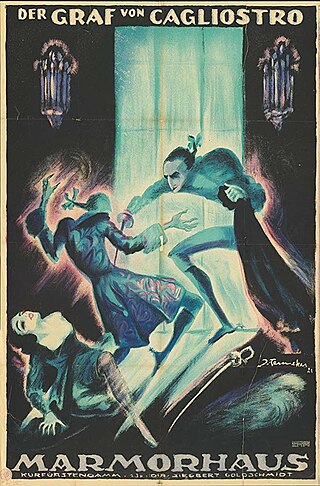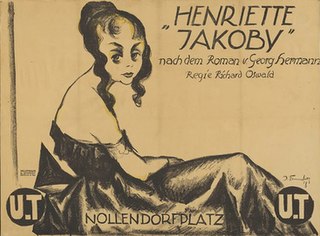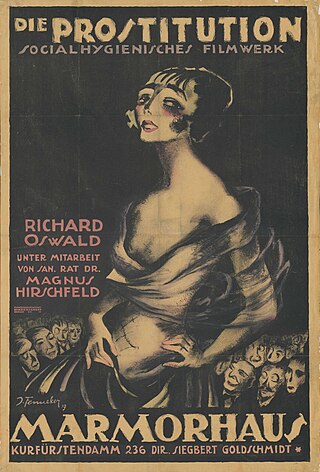
Hans Walter Conrad Veidt was a German-British actor. He attracted early attention for his roles in the films Different from the Others (1919), The Cabinet of Dr. Caligari (1920), and The Man Who Laughs (1928). After a successful career in German silent films, where he was one of the best-paid stars of UFA, Veidt and his new Jewish wife Ilona Prager left Germany in 1933 after the Nazis came to power. The couple settled in Britain, where he took citizenship in 1939. Veidt subsequently appeared in many British films, including The Thief of Bagdad (1940). After immigrating to the United States around 1941, he was cast as Major Strasser in Casablanca (1942), his last film role to be released during his lifetime.

Lady Hamilton is a 1921 German silent historical film directed by Richard Oswald and starring Liane Haid, Conrad Veidt and Werner Krauss. The film depicts the love affair between the British Admiral Lord Nelson and Lady Emma Hamilton. It was based on two novels by Heinrich Vollrath Schumacher. A copy of the film exists in a Russian film archive.
Storm over Asia is a 1938 French drama film directed by Richard Oswald and starring Conrad Veidt, Sessue Hayakawa and Madeleine Robinson.

Fear is a 1917 German silent horror film written and directed by Robert Wiene and starring Bruno Decarli, Conrad Veidt and Bernhard Goetzke.

Should We Be Silent? is a 1926 German silent drama film directed by Richard Oswald and starring Conrad Veidt, Walter Rilla and Henri De Vries. It was made at the Johannisthal Studios in Berlin. The film's art direction was by Heinrich Richter-Berlin. The film exists only in fragmentary form.

Der Graf von Cagliostro is a 1920 silent film directed and co-written by Reinhold Schünzel and starring Schünzel, Anita Berber and Conrad Veidt. It depicts the life of the eighteenth century Italian mesmerist and occultist Alessandro Cagliostro, who called himself Cagliostro. The film is considered a lost film.
The House of Three Girls is a 1918 German silent film directed by Richard Oswald and starring Julius Spielmann, Wilhelm Diegelmann and Sybille Binder. It is based on the operetta Das Dreimäderlhaus. It is a lost film.

Henriette Jacoby is a 1918 German silent film directed by Richard Oswald and starring Mechthildis Thein, Conrad Veidt and Leo Connard. It is the sequel to Jettchen Gebert's Story. It is a lost film.
Peer Gynt is a 1919 German silent film directed by Victor Barnowsky and Richard Oswald and starring Heinz Salfner, Ilka Grüning and Lina Lossen. It is based upon the play by Henrik Ibsen.
Alfred Schirokauer was a German novelist and screenwriter. He also directed three films during the silent era. Many films were based on his novels including several adaptations of Lucrezia Borgia. After the rise of the Nazi Party to power in 1933 the Jewish Schirokauer emigrated to Amsterdam and then to Austria where he died the following year.

Diary of a Lost Woman is a 1918 German silent drama film directed by Richard Oswald and starring Erna Morena, Reinhold Schünzel, and Werner Krauss. The rising star Conrad Veidt also appeared. It is now considered a lost film. It was remade at the end of the silent era as Diary of a Lost Girl by Georg Wilhelm Pabst.
Kurfürstendamm is a 1920 German silent drama film directed by Richard Oswald and starring Conrad Veidt, Asta Nielsen, Erna Morena and Henry Sze. It is set on the Kurfürstendamm in central Berlin. It is now considered a lost film.
The Eyes of the World is a 1920 German silent film directed by Carl Wilhelm and starring Conrad Veidt, Ressel Orla and Anton Edthofer.

Prince Cuckoo is a 1919 German silent drama film directed by Paul Leni and starring Conrad Veidt, Olga Limburg, and Magnus Stifter. It premiered at the Marmorhaus. It is now considered a lost film.
People in Ecstasy is a 1921 German silent film directed by Julius Geisendörfer and starring Conrad Veidt.

When the Dead Speak is a 1917 German silent drama film directed by Robert Reinert and starring Maria Carmi, Carl de Vogt and Conrad Veidt.
The Spy is a 1917 German silent war espionage film directed by Karl Heiland and starring Ferdinand Bonn, Ellen Richter and Conrad Veidt. It was made as a propaganda film to support the German war effort during the First World War. It is now considered a lost film.

The Passion of Inge Krafft is a 1921 German silent drama film directed by Robert Dinesen and starring Mia May, Albert Steinrück and Conrad Veidt.
Country Roads and the Big City is a 1921 German silent film directed by Carl Wilhelm and starring Carola Toelle, Fritz Kortner and Conrad Veidt.

Prostitution is a 1919 German silent drama film directed by Richard Oswald and starring Conrad Veidt, Reinhold Schünzel and Gussy Holl. It was released in two parts Das gelbe Haus and Die sich verkaufen. It was one of several enlightenment films made during the era by Oswald. The physician Magnus Hirschfeld was an advisor on the production. The first part premiered at the Marmorhaus in Berlin.











